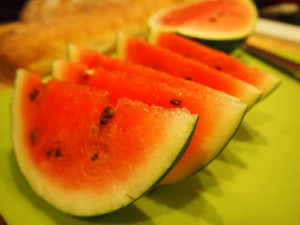Short Answer:
Yes, Watermelon is Paleo!
Water-y Melon
Along with cantaloupe, cucumber, squash and honeydew, watermelon is a member of the family Cucurbitaceae that grows on vines on the ground. It features thick green rinds that are often striped and can be round or oblong in shape. Watermelons have originated in Africa and it dates back to several thousands of years ago.
Because watermelons have extremely high water content which is approximately 92%, its flesh have juicy and subtly crunchy texture. Watermelons have sweet taste and the color of its flesh varies from dark red to pink. The rinds and seeds of watermelon are edible too. This fruit is usually eaten raw and is used in making pickles and juices.
Nutritional Value of Watermelon
Watermelon is a nutrient-dense food. Like most fruits, watermelon is rich in vitamin C and lycopene. It is also an excellent source of vitamin A and potassium. Watermelon contains significant amounts of other minerals like thiamin, riboflavin, niacin, vitamin B-6, folate, pantothenic acid, magnesium, phosphorus, zinc, copper, manganese, selenium, choline, lycopene and betaine.
Compared to other fruits and vegetables, the lycopene content of watermelon is higher. Lycopene are known for its ability to prevent heart diseases. Watermelon also contains phenolic antioxidants such as citruline, cucurbitacin E and triterpene which have anti-inflammatory properties.
Health Benefits of Watermelon
Eating fruits and vegetables have been associated with reduced risk of many health conditions. This is true with watermelons. Watermelon consumption has been linked to decreased risk of certain illnesses such as diabetes and heart diseases. Below are some of the reasons why you should eat watermelons.
Antioxidants and Anti-inflammatory Support
Watermelon is rich in vitamin C which is a natural antioxidant that wards off damages caused by free radicals together with beta carotenes. It contains phenolic compounds that have anti-inflammatory benefits. Lycopene is responsible for giving watermelon its reddish-pink color and is an inhibitor of inflammatory processes that repairs damaged tissues in the body. Another anti-inflammatory compound found in watermelon is cucurbitacin E.
Heart Health
The significant amounts of potassium and magnesium in watermelon are beneficial in regulating blood pressure. Potassium has the ability to stimulate increased blood flow by reducing tension on the blood vessels and arteries.
Watermelons contain carotenoid lycopene that can prevent hardening of artery walls and veins which reduce risk of blood clots, hypertension, strokes, heart attacks and atherosclerosis.
Digestive Support
Because watermelon is made up of 92% water, it can prevent occurrence of constipation and therefore promote healthy digestive system.
Skin Health
Watermelon contains high amounts of vitamin A that is necessary for the growth of all bodily tissues including hair and skin. Vitamin C which is rich in watermelon can slow down aging. Watermelon also contributes to overall hydration that is essential for healthy skin.
Kidney Function
The high amounts of potassium present in watermelon are helpful in reducing toxic deposits in the kidney and reducing concentration of uric acid in the blood. This aids in reducing risk of kidney damage and failure. The water content of watermelon can induce frequent urination which can also help in cleaning the kidneys.
Eye Health
Beta carotene, lutein, zexanthin and vitamin C which are all found in watermelon are beneficial in protecting the eyesf from age-related blindness and macular degeneration.
Cancer Prevention
Another added benefit of lycopene is that it has been linked to decreased risk of cancer particularly in the prostate. Together with vitamin C, it can combat the formation of free radicals that cause cancer.
Impotence
Arginine is another compound present in watermerlon. It is beneficial in curing erectile dysfunction for men.
Caution on Watermelons
While watermelons are nutritious and is composed of mainly water, it should be considered that it is one of those fruits that are quite high in sugar. So for people who have diabetes, it should be consumed in moderation.
What Experts Say About Watermelon
“But even if watermelon won’t turn you into a stud in the sack, there are a few benefits that we can all enjoy. For one, that same mechanism that helps put the wind into men’s sails also relaxes blood vessels elsewhere in the body, helping to reduce the risk of heart disease, decrease blood pressure and help improve circulatory and immune function”. – Mark Sisson
http://www.marksdailyapple.com/watermelon-natural-viagra/
“..there’s nothing wrong with eating watermelon for most people occasionally just because it’s high on the glycemic index.” – Chris Kresser
https://chriskresser.com/is-the-glycemic-index-useful/
All you ever wanted to know about Watermelon and Paleo
Mark’s Daily Apple. Watermelon a Natural Viagra?
http://www.marksdailyapple.com/watermelon-natural-viagra/
Chris Kresser. Is the Glycemic Index Useful?
https://chriskresser.com/is-the-glycemic-index-useful/
Paleo Grubs. 20 Healthiest Paleo Approved Foods
http://paleogrubs.com/healthiest-paleo-diet-foods
Paleo Hacks. Watermelon Recipes
http://blog.paleohacks.com/watermelon-recipes
Paleo Porn. Is Watermelon Paleo?
https://paleoporn.com/q/is-watermelon-paleo/
The World’s Healthiest Foods. Watermelon
http://www.whfoods.com/genpage.php?tname=foodspice&dbid=31
Organic Facts. Health Benefits of Watermelon
https://www.organicfacts.net/health-benefits/fruit/watermelon.html
Did we miss anything?
Comment below and let us know what you think. Do you agree with our conclusion?
photo credit: wayneandwax september-2016-85
